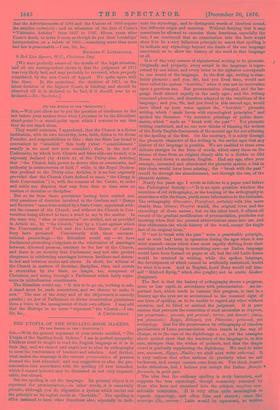frO THE EDITOR OF THE "SPECTATOR:] SLE7—Will you allow me'to
put the question of obedience to the law before your readers from what I presume to be the Ritualistic stand-point ?—a stand-point upon which i venture to say that they do not stand alone.
They would maintain, I apprehend, that the Church is a divine institution, with its own hierarchy, laws, faith, duties to its divine Founder, and responsibilities to Him ; that the State has found it convenient to " establish " this body (what " establishment " exactly is we need not now consider) ; that, in the Act of Uniformity, by which both Church and State alike are bound, it is expressly declared (by Article xic. of the Thirty-nine Articles) that "the Church hath power to decree rites or ceremonies, and authority in controversies of faith ;" while, in the Royal Declara- tion prefixed to the Thirty-nine Articles, it is no less expressly provided that the Church (here defined to mean "the Clergy in their Convocation ") is, with the consent of the Crown, to order and settle any disputes that may from time to time arise on matters of doctrine or discipline.
But so far from these provisions having been carried out,
vital questions of doctrine involved in the Gorham and "Essays and Reviews" cases were settled by a State Court, appointed with- out the consent of the Church, and without the Church in Con- vocation being allowed to have a word to say in the matter. In the same way, "rites or ceremonies" are settled, not as provided in Article xx., by "the Church," but by a Court against which the Convocation of York and the Lower House of Canter- bury have protested. Concurrently with these unconsti- tutional proceedings — the Ritualists would say —we have Parliament protecting clergymen in the celebration of marriages between divorced persons, contrary to the law of the Church, and there is no security that Parliament may not also protect clergymen in celebrating marriages between brothers and sisters- in-law and between uncles and nieces. In short, the witness. of the Church in matters of doctrine, discipline, rites, and morals is overridden by the State, no longer, too, composed of Christians, and acting through a Parliament which fairly repre- sents its latitudinarian constituents.
The Ritualists would say, "If this is to go on, nothing is safe.
A stand must be made somewhere, and we choose to make it now." The case of the Army and of the shipowners is scarcely parallel ; no Act of Parliament or divine constitution guarantees them a voice in the management of their own affairs. I may add that the Bishops in no sense " represent " the Church.—I am,


































 Previous page
Previous page